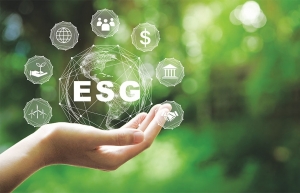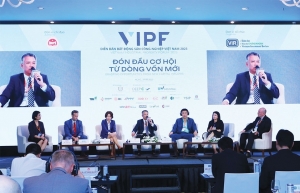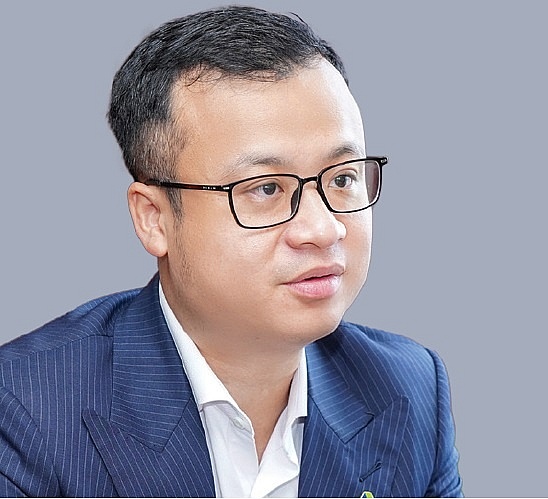Green-led incentives desired by businesses
Deputy Prime Minister Tran Hong Ha last week stated that businesses in Vietnam will have to continue facing green technical barriers if the green conversation is delayed, causing challenges for them during the process of penetrating both domestic and overseas markets.
 |
“To create new advantages for enterprises, the government will promulgate policies to promote the green and circular economy, especially the implementation of the Law on Environmental Protection, creating a legal framework for renewable energy, and a circular economy based on studying international practices,” he said at last week’s Vietnam Corporate Sustainability Forum.
“In addition, the government will promulgate preferential mechanisms to support enterprises that are implementing technology transformation, research and development centres and innovation ecosystems, and developing high-tech industrial zones and economic zones,” DPM Ha said.
His commitment, on behalf of the government, will create a mechanism to unlock the investment capital inflow from the private sector in new areas such as renewable energy, smart transport and agriculture, green urban building, and green finance.
In the framework of the National Green Growth Strategy for this decade and beyond, the target scale of the green economy will increase from $6.7 billion in 2020 to $300 billion in GDP by 2050.
Attracting new investment capital inflow and encouraging existing businesses to convert to green production depends on many factors, one of which is the complete legal framework and attractive incentives. Thus, last week’s forum will create motivation for businesses on their way to green production, sustainable growth, and adhering to environmental, social, and governance (ESG) standards, representatives said.
Tran Thanh Huong, ESG principal for Nokia Vietnam, said, “The challenge is the lack of synergies in the ecosystem for sustainable development, especially the participation of partners in the value chain of enterprises. We are looking forward to a coalition coordinated by the government with the participation of relevant ministries and businesses in key economic sectors to create a synchronised ecosystem.”
Meanwhile, Dang Huong Lan, senior corporate affairs director at AES Vietnam, said, “The renewable energy certificate, which acts as an accounting or tracking mechanism for solar, wind, and other green energies as they flow into the power grid, has yet to be recognised in Vietnam. Thus, the attraction of capital in this sector is challenging. We expect that the government will integrate it in the related policy.”
AES is also looking forward to hearing the approval of price negotiations and power purchase agreement as soon as possible to open opportunities to attract investment in terms of renewable energy, Lan added.
Before having more detailed policies and guides from the government, businesses and manufacturers also need to improve their awareness and knowledge, and simultaneously understand their demand for green production transition.
“If a business does not have full sources of data about the convention, investors will have no way to understand what the corporation is doing and what the impacts are,” said Vu Chi Cong, director and head of ESG at VinaCapital.
“Having awareness of the importance of green transition, together with a full understanding of green growth issues, will drive a path for businesses to approach with green finance. In addition, those corporates that have good disclosure and records of information and data would have a better chance to approach the sources of financing,” Cong said.
| Binu Jacob - CEO, Nestlé Vietnam
Innovation and sustainability need to go hand in hand to achieve business goals while addressing social and environmental issues. Currently, investors are increasingly interested in firms that operate effectively while also positively impacting the environment and the surrounding society. In September 2021, Nestlé announced its goal to advance regenerative food system at scale that protects, regenerates and rejuvenates the environment, improves income for farmers, and enhances the sustainability and prosperity of the agricultural ecosystem. As a pioneering business in terms of sustainable development, Nestlé believes that creating value for society is the food group’s driving force. In Vietnam, Nestlé is implementing many sustainable initiatives, with priorities including nutrition and physical development for children, sustainable procurement, climate change and water management, women’s empowerment, and sustainable packaging. To contribute to encouraging a healthy lifestyle in the community, especially among children aged 6-17 years old, Nestlé MILO has implemented the Dynamic Vietnam programme. The initiative aims to support localities with improved nutrition, while also providing sports equipment for schools and encouraging parents to create conditions for their children to enjoy physically active lifestyles. To date, the drive has been deployed to nearly 8,500 schools in 36 provinces, gaining the participation of nearly 5 million children. To fulfil its commitment to sustainable procurement, Nestlé has focused on sustainable coffee production under the Nescafé Plan in the Central Highlands provinces since 2011. The programme has trained more than 330,000 people and allow more than 22,000 farmers to practice coffee production according to the 4C criteria. Nescafé Plan has also contributed to helping farmers save 40 per cent of the water needed for irrigation, reduce fertiliser use by 20 per cent, and increase their income by 30-100 per cent by applying reasonable intercropping models. When looking at social issues, enhancing the economic empowerment and status of women is an important part of Nestlé’s approach. Than Duc Viet - CEO, Garment 10 Corporation
Our company set a target that in 2025 we can reduce 10 per cent of energy consumption and 20 per cent of water consumption and by 2030, we can narrow down the gap in the textile sector in Vietnam. The current challenge is how to source recycled materials in Vietnam. Many companies have invested in and used such recycled materials. There is still a heavy reliance on international suppliers. Another challenge is the supply chain of green and cleaner production. It is not only necessary from the greener source, but also production and in parallel with that, we need to focus on investing in technology for energy efficiency. To become energy efficient, we have invested in the installation of solar and wind power. We invest by ourselves but we also cooperate with international funds for a win-win benefit, which helps to reduce our pressure of investment. We have been experiencing a kind of gradual transition from fossil fuels to using waste and biomass to reduce the cost of system operations, and are also focusing on investment for wastewater treatment. Dang Thi Hong Hanh - Co-founder, Energy and Environment Consultancy JSC
The enhancement of business awareness about the importance of sustainability is necessary. At present, the greatest challenge for businesses is the awareness of their obligations to global environmental issues such as climate change because its impact may not be direct to the business – other than internal pollution at enterprises. With the right awareness of leaders and business owners, subsequent difficulties related to technology and resources can be solved step by step. In addition, businesses need a detailed guide from the government and state authorities on these works, for example, greenhouse gas (GHG) inventories. At present, we work directly with the government to create legislation for GHG reduction, net-zero, and the carbon market for Vietnam. At the same time, we work with different businesses on their solutions for carbon emissions. We also work with the Japan International Cooperation Agency and the Ministry of Natural Resources and Environment to organise training courses to enhance business awareness on this subject. For example, last year we coordinated to hold a series of training courses on GHG inventory and planning for emissions reduction in areas such as cement, food and beverages, waste treatment, and more. Le Anh - Sustainable director, Duy Tan Plastic Recycling JSC
The story of the circular economy, green development, and sustainable development has been repeated again and again. Each business will approach the green economy from a different direction. As a long-standing business in the plastic industry, Duy Tan Group is currently developing a new life-cycle for the plastic industry, contributing to helping Vietnam become greener, cleaner, and more beautiful. Our recycling factory can collect, process and produce 30,000 tonnes of PET plastic per year and is expected to double its capacity. In 2022, this business has collected and recycled more than 1.3 billion plastic bottles, exported products to 12 countries and provided recycled packaging for big brands such as LaVie, Nestlé, and Coca-Cola. Duy Tan actively implements many committed programmes towards a circular economy. Many of our campaigns have spread to many people and communities, such as with the application of renewable energy, solar energy at factories, and exchanging rubbish and waste for gifts at supermarkets and schools. We are determined to become more sustainable, and not only for our customers. The company has recognised the threat that plastic waste poses to Vietnam, which is one of the top five countries in the world that together account for about 60 per cent of plastic pollution in the oceans. Cao Thi Ngoc Dung - Chairperson, Phu Nhuan Jewelery
An environmental, social, and governance (ESG) strategy has been integrated into the same overall development strategy. Thereby, all macro management strategies, initiatives, production, business, and social activities take ESG as a guideline. Today, increased scrutiny from investors, changes in consumer and customer expectations, and changes in public policy have made ESG standards a necessity for businesses. We are committed to complying with the law on environmental protection in all production and business activities. Notably, we have implemented and maintained a greenhouse gas inventory with a third party from 2021. At the same time, based on the proposed mitigation options after the inventory, we have collected and appraised and implemented environmental initiatives appropriate to the company. ESG is no longer just an option but has become a way for us to fulfill the mission of serving society and the community on our journey of sustainable development. Le Thi Ngoc My - Head of Sustainability, HEINEKEN Vietnam
For more than 30 years in Vietnam, sustainable development has been the guideline in all of our production and business activities. Our strategy consists of several main pillars: the environment, society and responsible drinking, zero environmental impact, and an inclusive, fair, and equal world. In the environmental field, all of our six factories have achieved zero landfill waste in production since 2021 and 96 per cent coming from renewable energies by 2022. Currently, we are actively implementing the programme of water conservation in cooperation with WWF Vietnam, aiming for the ambition of all water restitution by 2025. For us, sustainable development is a journey of working together. We are looking forward to continuing to receive the cooperation of the community and stakeholders on the journey for a better Vietnam. Nguyen Le Thang Long - Deputy CEO, An Phat Holdings
Aside from economic development and creating wealth for society, businesses must also show themselves as responsible to society and the environment. This requirement has become more urgent than ever as Vietnam has increasingly become involved in the global value chain. Businesses must soon transform sustainable production and business models to survive and develop in the long term, or lose competitiveness due to an inability to keep up with global trends. We identify sustainable development as a lodestar in our long-term development strategy. Over the past decade, we have constantly researched and developed new environmentally friendly product lines under the AnEco brand. In addition, we continuously improve and apply green technology in production to meet international standards on environmental sanitation, and make the most of renewable energy sources, as well as apply effective and energy-saving measures to ensure harmony between our business goals and responsibility for the environment. In Vietnam, an appropriate, specific, and clear roadmap is needed. To propel sustainable development, we hope to have in place more programmes that encourage businesses to embrace green growth models. Montri Suwanposri - President, C.P. Vietnam
In every production and business activity, we consistently ensure both economic goals with environmental and social benefits. We aim to provide high-quality products through the application of international standards, high technologies, and building a traceability system to supply high-quality and safe food. We comply with environmental protection regulations to minimise the impact of climate change, and apply effective use of energy and resources. A target of net-zero emissions by 2050 has been set, including renewable energy transition, energy efficiency improvement, and elimination of coal-based energy. Responding to the project on planting one billion trees by the prime minister, we are aiming to plant 1.5 million trees by 2025. We also established and shared sustainable values in association with 17 of the United Nations’s Sustainable Development Goals. Pham Thi Thu Huong - CEO, VSAPAT JSC
Sustainable development principles have been infiltrating local businesses at a vigorous pace. For our business, which is sachi oil production, aside from ensuring wage payment for employees, we find that meeting other requirements related to trade unions, human rights, social and environmental responsibilities, and community interests poses us great challenges. Our project can best satisfy sustainable development principles. Our business provides seeds to farmers who will grow sachi in the forest for short-term livelihoods. After 4-5 years, the business buys back the seeds from farmers to turn into edible oil with high export value. We are confident in the model that we are developing, and are pursuing it as our long-term vision. |
 | Consideration of ESG tools build up steam Companies large and small are building partnerships as well as working with relevant authorities to implement environmental, social, and governance considerations into their business operations. |
 | ESG becoming a benchmark for IZs Key stakeholders are signalling a paradigm shift in Vietnam’s industrial real estate, spotlighting environment, social, and corporate governance as the new cornerstone for future growth. |
What the stars mean:
★ Poor ★ ★ Promising ★★★ Good ★★★★ Very good ★★★★★ Exceptional
 Tag:
Tag:
Related Contents
Latest News
More News
- Businesses bouncing back after turbulent year (February 27, 2026 | 16:42)
- PM outlines new tasks for healthcare sector (February 25, 2026 | 16:00)
- Ho Chi Minh City launches plan for innovation and digital transformation (February 25, 2026 | 09:00)
- Vietnam sets ambitious dairy growth targets (February 24, 2026 | 18:00)
- Masan Consumer names new deputy CEO to drive foods and beverages growth (February 23, 2026 | 20:52)
- Myriad risks ahead, but ones Vietnam can confront (February 20, 2026 | 15:02)
- Vietnam making the leap into AI and semiconductors (February 20, 2026 | 09:37)
- Funding must be activated for semiconductor success (February 20, 2026 | 09:20)
- Resilience as new benchmark for smarter infrastructure (February 19, 2026 | 20:35)
- A golden time to shine within ASEAN (February 19, 2026 | 20:22)





























 Mobile Version
Mobile Version